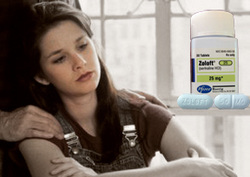
Zoloft and Depression
The increase in the number of pregnant women taking medications, including antidepressants as shown in a study does not bode well with Zoloft linked to the increased risk of birth defects among infants whose mothers were taking the medication during their pregnancy. Researchers from the Boston University School of Public Health said that the number of women using medication in the first trimester has increased by more than 60 percent now as compared to 30 years ago.
The birth defects could either be minor or life-threatening which could mean permanent injury or death to the infants. Pfizer-manufactured Zoloft and other selective serotonin reuptake inhibitors (SSRI) have been linked more and more to these birth defects for the past few years.
Zoloft, the brand name of Sertraline, is one of the most prescribed drugs in the world to treat a number of conditions such as depression, obsessive-compulsive disorder (OCD), panic attacks, posttraumatic stress disorder (PTSD), social anxiety disorder and premenstrual dysphoric disorder. The medication works by increasing serotonin, a natural substance in the brain, needed to maintain mental balance.
The Food and Drug Administration (FDA) issued an alert in the prescription of the drug after several studies suggested that infants born to mothers who took Zoloft or other SSRIs after the 20th week of their pregnancy were six times more likely to have persistent pulmonary hypertension (PPHN) as compared to infants whose mothers did not take antidepressants during their pregnancy. PPHN causes newborns to have increased pressure in the blood vessels in their lungs resulting to not enough oxygen into their bloodstream.
Aside from neonatal PPHN, other birth defects reportedly associated with Zoloft are septal heart defects wherein the baby has a hole in the heart and omphalocele, a condition wherein some parts of the baby’s intestines are found outside the abdominal wall. And the list of birth defects does not stop there as studies now include cranial skull defects, spina bifida, anal atresia and limb reduction defects. Infants inflicted with any of these birth defects would need to undergo prolonged hospitalization, respiratory support, and tube feeding.
Problems have also been known to be encountered during the infants’ delivery and these include respiratory distress, cyanosis, apnea, seizures, temperature instability, feeding difficulty, vomiting, hypoglycemia, hypotonia, hypertonia, hyperreflexia, tremor, jitteriness, irritability, and constant crying. These defects are listed as probably due to either a direct toxic effect of the medication or a drug withdrawal syndrome on the Zoloft drug insert.
Because there are no adequate, well-controlled studies in pregnant women, FDA classified Zoloft as a Pregnancy category C drug. The benefits of using SSRIs during pregnancy should be weighed against the potential risks it poses, according to the DFA which also recommended a thorough discussion between doctors and patients.
The birth defects could either be minor or life-threatening which could mean permanent injury or death to the infants. Pfizer-manufactured Zoloft and other selective serotonin reuptake inhibitors (SSRI) have been linked more and more to these birth defects for the past few years.
Zoloft, the brand name of Sertraline, is one of the most prescribed drugs in the world to treat a number of conditions such as depression, obsessive-compulsive disorder (OCD), panic attacks, posttraumatic stress disorder (PTSD), social anxiety disorder and premenstrual dysphoric disorder. The medication works by increasing serotonin, a natural substance in the brain, needed to maintain mental balance.
The Food and Drug Administration (FDA) issued an alert in the prescription of the drug after several studies suggested that infants born to mothers who took Zoloft or other SSRIs after the 20th week of their pregnancy were six times more likely to have persistent pulmonary hypertension (PPHN) as compared to infants whose mothers did not take antidepressants during their pregnancy. PPHN causes newborns to have increased pressure in the blood vessels in their lungs resulting to not enough oxygen into their bloodstream.
Aside from neonatal PPHN, other birth defects reportedly associated with Zoloft are septal heart defects wherein the baby has a hole in the heart and omphalocele, a condition wherein some parts of the baby’s intestines are found outside the abdominal wall. And the list of birth defects does not stop there as studies now include cranial skull defects, spina bifida, anal atresia and limb reduction defects. Infants inflicted with any of these birth defects would need to undergo prolonged hospitalization, respiratory support, and tube feeding.
Problems have also been known to be encountered during the infants’ delivery and these include respiratory distress, cyanosis, apnea, seizures, temperature instability, feeding difficulty, vomiting, hypoglycemia, hypotonia, hypertonia, hyperreflexia, tremor, jitteriness, irritability, and constant crying. These defects are listed as probably due to either a direct toxic effect of the medication or a drug withdrawal syndrome on the Zoloft drug insert.
Because there are no adequate, well-controlled studies in pregnant women, FDA classified Zoloft as a Pregnancy category C drug. The benefits of using SSRIs during pregnancy should be weighed against the potential risks it poses, according to the DFA which also recommended a thorough discussion between doctors and patients.
 RSS Feed
RSS Feed